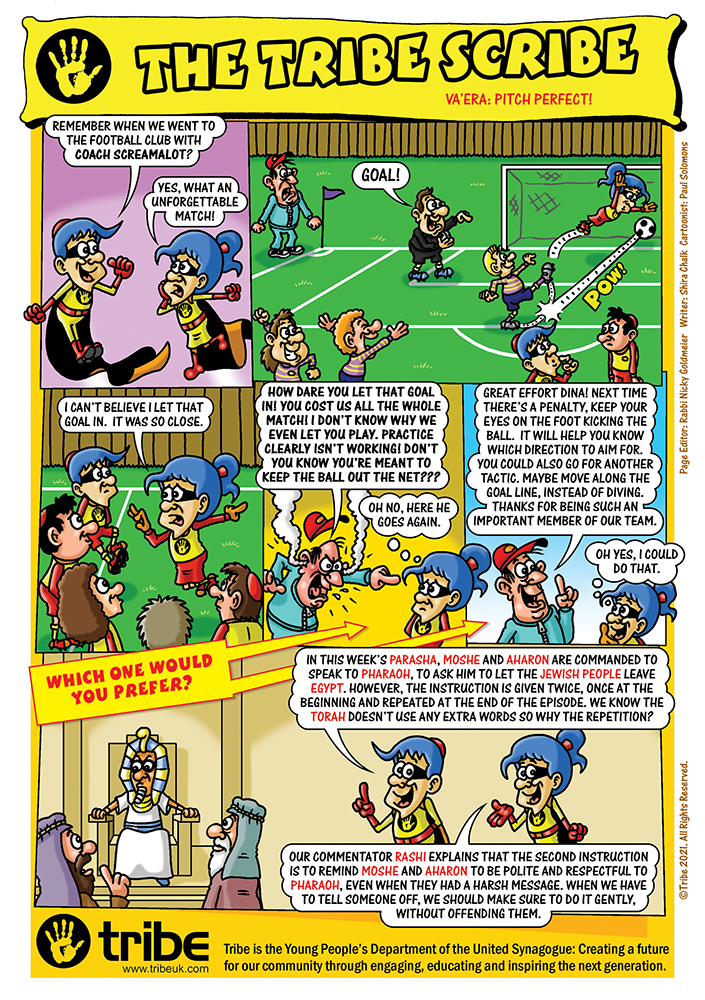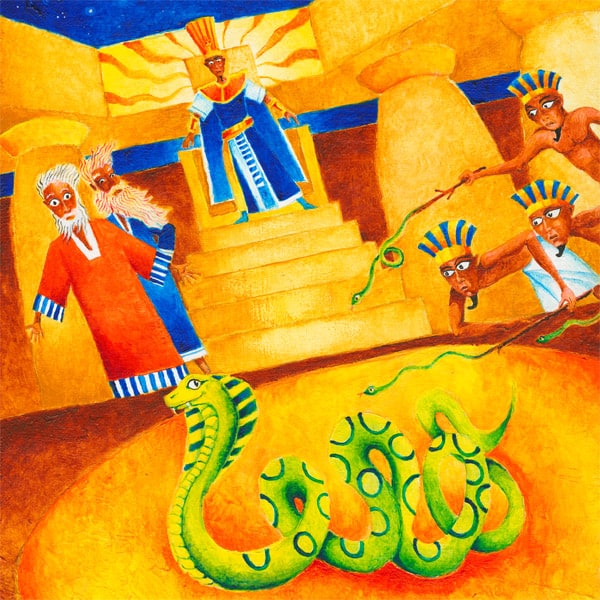Bonjour / Hello [nickname_else_first_name],
Table of contents
1) Perashat Hashavoua - Rabbi Eli Mansour
2) Halakhat Hashavoua (Halakhot related to day to day life) - Hazzan David Azerad
- The Establishment of Torah Reading -(peninei halacha)
3) Holy Jokes!
4) FOR KIDS!

This Week's Parasha Insight with Rabbi Eli Mansour
Parashat Vaera: The Four Cups and Our Ancestors’ “Discount”
In the beginning of Parashat Vaera we read of the famous "Arba Leshonot Ge’ula" – "four expressions of redemption." G-d told Moshe to convey to Beneh Yisrael His promise to "take them" from Egypt, to "save them" from bondage, to "redeem them," and to "take them" as His special nation ("Ve’hoseti," "Ve’hisalti," "Ve’ga’alti," "Ve’lakahti"). Many people are familiar with the teaching of the Talmud Yerushalmi in Masechet Pesahim that the four cups of wine we drink at the Seder on Pesah commemorate these four promises.
What is less known, however, is the second explanation of the four cups given by the Yerushalmi. Surprisingly, the Yerushalmi associates this Misva with the dream of Pharaoh’s cup-bearer, as he reported it to Yosef. The cup-bearer dreamt of squeezing grapes into Pharaoh’s cup and then handing the cup to Pharaoh, and Yosef correctly interpreted this vision as foretelling the cup-bearer’s imminent release from prison and reinstatement to his post. The word "Kos" ("cup") appears four times in the story of the cup-bearer’s dream, and we thus commemorate this dream by drinking four cups of wine at the Seder on Pesah.
The obvious question arises, what connection is there between the cup-bearer’s dream and the Pesah celebration? Why is it important to remember this dream as we celebrate the Exodus from Egypt?
The answer can be found in the special "discount" which Beneh Yisrael received in Egypt.
In one of G-d’s prophecies to Abraham Avinu, He informed the patriarch that his descendants would endure 400 years of suffering and persecution in a foreign land. In Parashat Bo (12:40), the Torah tells us that the precise number of years was actually 430. Yet, Beneh Yisrael ended up spending only 210 years in Egypt. Many different explanations have been given for this remarkable "discount." Some explain that the work was so difficult and so intense that Beneh Yisrael completed in just 210 years the amount of slave labor that would normally be performed over the course of 400 years. Others claim that Beneh Yisrael’s supernatural population growth in Egypt meant that the slave labor was performed by an exceptionally large number of people, such that they completed the decreed period of slavery in just 210 years. Another famous answer is that Beneh Yisrael had plummeted to the "49th level of impurity," and had they remained any longer, they would have fallen to the 50th level, from which they would have been unable to recover. And so although they were to have remained for another 190 years, G-d could not let them stay a moment longer.
Regardless of how we understand the reason for this "discount," we can trace its roots to Yosef, specifically, to the system he set in place when he served as vizier over Egypt.
Towards the end of Parashat Vayigash, we read that during the years of famine in Egypt, Yosef essentially revamped the country’s entire economy. On behalf of Pharaoh, Yosef purchased all the agricultural lands in Egypt in exchange for grain, such that the people worked as serfs for Pharaoh. Yosef established that the people must pay 20 percent of their produce to Pharaoh, and they may then keep the other 80 percent. The Torah emphasizes that Yosef made this a "Hok" – an official rule, that the farmers paid 20 percent and kept the remaining 80 percent.
At first glance, it seems difficult to understand why the Torah gives us this information. Why is it important for us to know the economic policy that Yosef enacted when he ruled over Egypt?
The answer, perhaps, is that Yosef, prophetically foreseeing the slavery and bondage that Beneh Yisrael would soon endure, wanted to help them by establishing a rule allowing an 80 percent "discount." The policy Yosef enacted for the Egyptians was applicable also to Beneh Yisrael vis-à-vis the decree that they would endure a 430-year period of exile. The Midrash teaches that although Beneh Yisrael spent 210 years in Egypt, they were enslaved only when Miriam, Moshe’s sister, was born – 86 years before the Exodus. It emerges, then, that Beneh Yisrael suffered for only 20 percent of the period that was decreed – 86 years, instead of 430 years. This is the deeper significance of Yosef’s enacting this policy in Egypt.
With this in mind, we can return to the story of the cup-bearer’s dream, and understand why the dream is worthy of commemoration on Pesah. The word "Kos" in Gematria equals 86. When Yosef saw how the word "Kos" was used four times in the context of the cup-bearer’s dream, he realized that he was being assigned a mission – to reduce four times the value of the word "Kos" (86) from the decree issued against his people. Therefore, upon rising to the position of vizier, in the capacity of which he managed the Egyptian economy, he put in place this policy of paying just 20 percent – so that Beneh Yisrael would be able to leave after "paying" just 20 percent of the period of slavery that had been decreed, 86 years instead of 430 years.
This is why we commemorate the cup-bearer’s dream at the Seder. This dream is what facilitated the 80-percent "discount" that our ancestors received. The four instances of the word "Kos" in the context of that dream is what led to the reduction of four times the word "Kos" from the decree of slavery, enabling Beneh Yisrael to leave after working for 86 years.

The Establishment of Torah Reading -(peninei halacha)
The mitzvah to learn Torah is a basic commandment, on which all the other mitzvot depend. There is no specific time for Torah study; instead, it is a mitzvah to learn Torah at all times, as it is written (Joshua 1:8), “You shall meditate upon it day and night.” In order to strengthen Israel’s connection to Torah, Moshe Rabbeinu instituted the Torah reading on Shabbat, and in Shacharit of Yom Sheni (Monday) and Yom Hameshee (Thursday), so that three days will not pass without hearing Torah (Rambam Tefillah 12:1).
The Chachamim teach (Bava Kama 82a) that this was instituted based on the verse (Exodus 15:22), “They traveled for three days in the desert without finding any water.” Moshe Rabbeinu, and his disciples, the elders and the prophets, understood that the thirst for water was a result of three consecutive days during which Israel did not communally engage in Torah study. Torah is likened to water, for just as water sustains all that lives and grows in the world, so Torah sustains the soul. Since the nation became slightly detached from the Torah, the springs of water also ceased to flow. Although the Torah scholars of that generation most probably learned Torah during those three days, for three days the nation of Israel did not engage in Torah publicly. Therefore it was established that the Torah would be read every Monday, Thursday, and Shabbat, so that never again will more than three days pass when Israel does not publically read from the Torah.
Ezra HaSofer further instituted that, for the Torah reading on Mondays and Thursdays, three people are called up to the Torah. Each person called up reads at least three verses. All together ten verses must be read (Bava Kama 82a; Shulchan Aruch 137:1-2;
Bevirkat Shabbat Shalom umevorach
David Azerad
3) HOLY JoKeS!!
Selection of funny snippets, loosely related to this weeks parashah or current events, to brighten your day



4) FOR KIDS
Click on the image to open the youtube video















